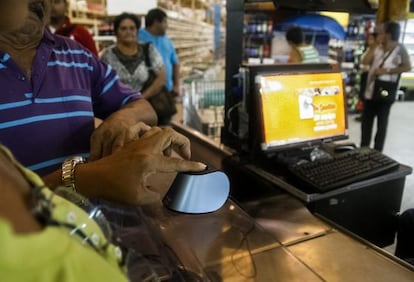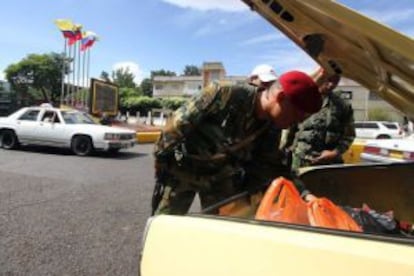On the trail of Venezuela’s food smugglers
EL PAÍS takes a trip with a ‘bachaquero,’ who sells subsidized goods in Colombia at market prices

On August 22, Venezuelan President Nicolás Maduro issued a decree banning the export of up to 89 popular consumer products. The move was part of a government drive to reduce smuggling in the country.
But this did not stop Obama — an assumed name — from renewing his attempts at selling meat, chicken and cheese in Colombia to make some extra money. As an employee at a refrigeration plant, he takes home a regular monthly paycheck of 6,000 bolívares (around €51).
Obama, 25, recently got married and is father to a little girl. He lives in Maracaibo, Venezuela’s second most important city, where he makes a living as a bachaquero. This is the government’s term for a person who smuggles subsidized goods across the border to sell them at market prices.
Up to 40 percent of subsidized goods aimed at the domestic market are disappearing from Venezuela, according to official figures. This has triggered two government responses: first, strict military patrols along the 2,200km stretch of land separating Venezuela from Colombia; second, a drive to get supermarkets, pharmacies and small establishments to join a program that records their customers’ fingerprints.
The lieutenant returns and sticks half his body into the car, waiting for his bribe money
This week, all the main supermarket chains in Maracaibo began installing biometrics systems to limit the amount of basic food products that individuals may purchase. At first sight, the initiative would seem to be a solution to the deplorable spectacle of watching customers fighting one another over scarce items. But even this will not guarantee supply.
Last Wednesday, a store named Súper Tienda Latino, located on Avenue 15, in Maracaibo’s well-off northern section, displayed shelves filled with disinfectant, rice, coffee, margarine and toilet paper, although cornmeal and meat were hard to come by. “We haven’t been receiving that for a long time,” admitted Frank Vergara, the store manager.
Yet Obama has access to first-rate meat and chicken, which sell in Venezuela for 90 bolívares ($1) and 43 bolívares ($0.50) a kilogram, respectively. He gets them from his boss at wholesale prices and sells them to three clients in Maicao, the first Colombian village across the border.
It is a risky activity. On August 23, television news showed Vice-President Jorge Arreaza and another top official, Diosdado Cabello, surrounded by 63,000 liters of fuel and 10 tons of food seized at one of the checkpoints that Obama will have to negotiate before reaching his destination.
“There will be serious sanctions against any public servant or member of the Armed Forces who allows the nation’s food to leave the country,” warned Arreaza on the TV screen.
Obama does the sign of the cross before loading up 13kg of meat, 20kg of chicken and 40kg of hard white cheese into the trunk of an old 1983 Caprice Classic that belongs to Jorge, a taxi driver who never misses Sunday Mass. These vehicles are highly valued in the area because of their enormous gas tanks, which can hold around 110 liters of fuel. This allows the drivers to sell what’s left over in Colombia as well.
There will be serious sanctions for anyone who allows the nation’s food to leave the country” Jorge Arreaza, vice-president
The trip is good business for everyone involved: Obama will sell the meat at $4.60 a kilo, and Jorge will negotiate the sale of his extra gas, which goes for around $13 for every 23 liters.
The sun starts to go down on the newly paved road to Maicao, 100 kilometers away. Along the way, Obama and Jorge conceal their nerves by recounting their most hilarious adventures as bachaqueros. The distance would normally be covered in an hour-and-a-half, but checkpoints on the Venezuelan side extend it to three hours. President Maduro has also ordered the border shut down between 10pm and 5am to avoid smuggling activities. The bachaqueros need to hurry — the meat and the chicken are beginning to defrost.
The vehicle reaches the first checkpoint. Obama gives Jorge $7 to pay off the guard. They get lucky: the official tells them to be on their way. But at the second checkpoint, Las Guardias, a lieutenant orders Jorge to stop the vehicle.

—What do you have there in the trunk?
—I’m going to give you your picada [bribe].
—Get out and open it.
Jorge asks Obama for the receipt for the food items. This will prove to authorities that they truly own the merchandise.
Ten minutes later, Jorge returns to the car and says that they will have to wait a while.
—Did he accept the bribe or not?
—Calm down, dammit. The man is going to speak with the captain so we can keep going.
The lieutenant returns and pokes half his body into the car, waiting for his money. A resigned-looking Jorge takes five 100-bolívar bills (a bit over $5) and places them inside his jacket. The lieutenant shuts the door and blows his whistle to move them along.
Before reaching the next checkpoint, Obama will have to continue the journey in a different vehicle. The road now goes through muddy terrain and Jorge’s car is not made for that. In Los Filúos, a dark place that looks like an Arab market and is filled with people speaking indigenous languages, Obama boards an old truck-turned-passenger bus. The driver, an indigenous man named Fabio, tells Obama to hide his goods. The other passengers, most of whom are members of the Wayuu ethnic group, do the same. They, too, are smuggling food into Colombia for resale.
The truck veers off onto a dirt track that crosses thick bushes and several estates where a toll has to be paid for the privilege of traversing the land: 100 bolívares here, 50 there, 200 more at the end of the road.
When the truck finally reaches its destination, there is Jorge, waiting next to his Caprice Classic. At his feet are four loads of Harina Pan, Venezuela’s best-known flour brand for arepas, an essential part of the Venezuelan diet. Each load contains 20 packages weighing a kilo each.
Before turning the goods over to his clients, who are all resellers, Obama asks them how much each flour package will sell for. The answer is 2,000 Colombian pesos, around 90 bolívares (one dollar). In Venezuela the same unit cost him 14 bolívares, six times less.
Tu suscripción se está usando en otro dispositivo
¿Quieres añadir otro usuario a tu suscripción?
Si continúas leyendo en este dispositivo, no se podrá leer en el otro.
FlechaTu suscripción se está usando en otro dispositivo y solo puedes acceder a EL PAÍS desde un dispositivo a la vez.
Si quieres compartir tu cuenta, cambia tu suscripción a la modalidad Premium, así podrás añadir otro usuario. Cada uno accederá con su propia cuenta de email, lo que os permitirá personalizar vuestra experiencia en EL PAÍS.
¿Tienes una suscripción de empresa? Accede aquí para contratar más cuentas.
En el caso de no saber quién está usando tu cuenta, te recomendamos cambiar tu contraseña aquí.
Si decides continuar compartiendo tu cuenta, este mensaje se mostrará en tu dispositivo y en el de la otra persona que está usando tu cuenta de forma indefinida, afectando a tu experiencia de lectura. Puedes consultar aquí los términos y condiciones de la suscripción digital.








































